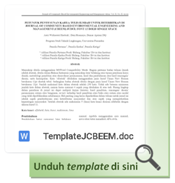Enhancing Household Waste Management for Climate Change Mitigation: A Case Study of RW 06, Pasirluyu, Bandung, Indonesia
DOI:
https://doi.org/10.23969/jcbeem.v8i2.18449Keywords:
waste management, climate change mitigation, composting, recycling, community engagementAbstract
In exploring how household waste management contributes positively towards climate change mitigation in RW (sub hamlet) 06, Pasirluyu Sub District, Bandung, the objective of this study is to assess existing waste management practices; promoted community awareness as well as aligning them with climate actions like waste reduction programs through recycling and composting initiatives. Recommendation is suggested for enhancing household waste management, especially facing the climate change mitigation. A total of 10 representative households were followed for 30 days collecting data on their wastes generation, separation and treatment processes that included various types of waste such as organic, inorganic and residual where organic wastes were composted using a Takakura method. The findings reveal that between 40-60% of the total amount of household garbage are made up of organic substances while inorganic substances account for about 20-35% and lastly residuals constitute only 5-10%. Households managed to separate their wastes properly on one hand though on another incorrect sorting was noted complicated by inconsistent participation. Thus composting resulted into reduced amounts of organic waste going to landfills thereby minimizing methane emissions. But then again limited infrastructural facilities as well as low levels of understanding were some other barriers against enforcing these practices. Continuous community engagement, enhanced infrastructure, and policy support are essential for aligning waste management with climate change mitigation efforts in RW 06. The findings contribute to broader sustainability goals and highlight the potential for similar urban communities to adopt climate-conscious waste management practices.
Downloads
References
Agustang, A., Hairuddin, K., Agustang, A. D., & Yulis, D. M. (2023). The Role of Stakeholders in The Management of Sustainable Environmental Cleanliness in Makassar City. Journal of Etika Demokrasi , 8 (2), 191-205.
Aprilia, A., Tezuka, T., & Spaargaren, G. (2013). Inorganic and hazardous solid waste management:Current status and challenges for Indonesia. Procedia Environmental Sciences , 17, 640-647.
Fadhullah, W., Imran, N. I., Ismail, S. N., Jaafar, M. H., & Abdullah, H. (2022). Household solid waste management practices and perceptions among residents in the East Coast of Malaysia. BMC Public Health , 22 (1).
Jouhara, H., Czajczyńska, D., Ghazal, H., Krzyżyńska, R., Anguilano, L., et al. (2017). Municipal waste management systems for domestic use. Energy , 139, 485-506.
Mahartin, T. L. (2023). Waste management plan with reduce, reuse, recycle (3r) method. Journal of Sustainability, Society, and eco-welfare , 1 (1).
Martitah, M., Sulistianingsih, D., Sumarto, S., & Adhi, Y. P. (2024). Legal Strategies in Household Waste Management in Villages. The Indonesian Journal of International Clinical Legal Education , 6 (2), 183-208.
Rachman, I., Soesanto, Q. M., Khair, H., & Matsumoto, T. (2020). Participation of Leaders and Community in Solid Waste Management In Indonesia to Reduce Landfill Waste Load. Journal of Community Based Environmental Engineering and Management , 4 (2), 75-84.
Safitri, Y., Ariyaningsih, & Shaw, R. (2024). Stakeholders’ Involvement in Household Solid Waste Management (HSWM) during COVID-19. International Review for Spatial Planning and Sustainable Development , 12 (3), 238-257.
Wulandari, I. S., Soemarno, & Koderi. (2021). An Analysis on Household waste Management during Covid-19 Pandemic Era (Study at Suzuki Residents, North Minahasa). J-PAL , 12 (1), 6-14.














